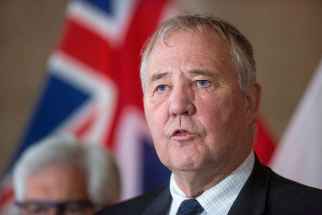Andrew Scheer’s big, bold 19th-century idea
Read this article for free:
or
Already have an account? Log in here »
To continue reading, please subscribe:
Monthly Digital Subscription
$0 for the first 4 weeks*
- Enjoy unlimited reading on winnipegfreepress.com
- Read the E-Edition, our digital replica newspaper
- Access News Break, our award-winning app
- Play interactive puzzles
*No charge for 4 weeks then price increases to the regular rate of $19.00 plus GST every four weeks. Offer available to new and qualified returning subscribers only. Cancel any time.
Monthly Digital Subscription
$4.75/week*
- Enjoy unlimited reading on winnipegfreepress.com
- Read the E-Edition, our digital replica newspaper
- Access News Break, our award-winning app
- Play interactive puzzles
*Billed as $19 plus GST every four weeks. Cancel any time.
To continue reading, please subscribe:
Add Free Press access to your Brandon Sun subscription for only an additional
$1 for the first 4 weeks*
*Your next subscription payment will increase by $1.00 and you will be charged $16.99 plus GST for four weeks. After four weeks, your payment will increase to $23.99 plus GST every four weeks.
Read unlimited articles for free today:
or
Already have an account? Log in here »
Hey there, time traveller!
This article was published 27/05/2019 (2393 days ago), so information in it may no longer be current.
Conservative Leader Andrew Scheer, once he becomes prime minister, will establish a coast-to-coast corridor for oil pipelines and power transmission lines. Provinces and Indigenous communities will agree in advance to pipelines and power lines within the corridor. Energy will flow freely through the country and everyone will be happy. Wow! Why did no one else think of that?
It’s a very suitable Big Idea for a Conservative leader. John A. Macdonald, the party’s first leader and prime minister, conceived and achieved the national dream of a coast-to-coast rail line in the 1870s and 1880s, with momentous effects on both the national economy and Indigenous Peoples. Mr. Scheer’s energy corridor is a correspondingly bold 19th-century idea.

Mr. Scheer has been touring the country and outlining his program. He covered foreign policy in a May 7 speech in Montreal and economic policy on May 16 in Toronto. The Toronto speech was mostly about balancing the federal budget while cutting taxes. The startling new element he introduced was the energy corridor.
He would work, he said, toward “a dedicated, coast-to-coast right-of-way specifically set aside for energy infrastructure projects. Rather than have industry submit complicated route proposals for every new transmission line and pipeline project, we could have a single corridor — planned upfront and in full consultation with the provinces and with Indigenous Canadians who would share in the prosperity that it would provide. With a single corridor, we could minimize environmental impacts, lower the costs of environmental assessments, increase certainty for investors and, most importantly, get these critical projects built.”
On closer inspection, however, the proposal seems unlikely to arouse much enthusiasm outside the oil and gas industry. Such a corridor is sure to run through some province’s territory and cross some Indigenous land. Why would any province or Indigenous community sign a blank cheque to support pipeline projects that have not even been proposed yet, much less designed?
As long as it sounds like a proposal to put the pipelines somewhere else and Not In My Back Yard, it could seem appealing. Eventually, however, the corridor would lie in someone’s backyard — under the St. Lawrence River at Montreal, for instance, or through the Yellowhead Pass in Alberta and British Columbia.
The obstacles to pipeline or power line construction in Canada and the United States are difficult enough when just one line with one purpose and one set of ownership and environmental issues is under study. Those obstacles will not be made less by lumping all the current and potential pipelines and power lines together in a single corridor.

The corridor idea seems like a shortcut or an end run around environmental assessment and negotiation with landowners. But Canada’s experience has shown that shortcuts and end runs finish up in court. Law, policy and the prevailing public mood have changed since John A. Macdonald’s day. There may be a substitute for the slow, patient work of designing and locating a pipeline to do the least possible damage and harm the fewest neighbours, but Mr. Scheer has not found it.
The British Columbia Appeal Court unanimously found last week that the B.C. government had no power to regulate oil shipments through the Trans Mountain pipeline. That ruling, upholding federal authority, will have more impact than Mr. Scheer’s corridor idea when it comes to opening the way for pipeline construction.










